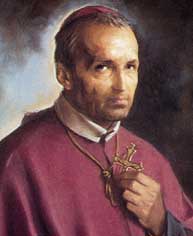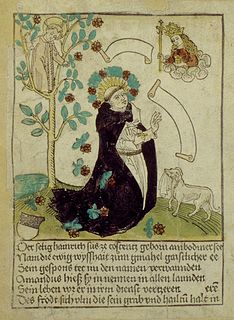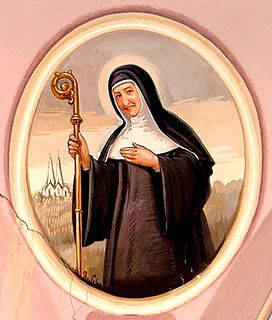Related Research Articles

Cyril of Alexandria was the Patriarch of Alexandria from 412 to 444. He was enthroned when the city was at the height of its influence and power within the Roman Empire. Cyril wrote extensively and was a leading antagonist in the Christological controversies of the late-4th and 5th centuries. He was a central figure in the Council of Ephesus in 431, which led to the deposition of Nestorius as Patriarch of Constantinople. Cyril is counted among the Church Fathers and also as a Doctor of the Church, and his reputation within the Christian world has resulted in his titles Pillar of Faith and Seal of all the Fathers. The Roman emperor Theodosius II, however, condemned him for behaving like a "proud pharaoh", and the Nestorian bishops at their synod at the Council of Ephesus declared him a heretic, labelling him as a "monster, born and educated for the destruction of the church."

Lucius Caecilius FirmianussignoLactantius was an early Christian author who became an advisor to Roman emperor, Constantine I, guiding his Christian religious policy in its initial stages of emergence, and a tutor to his son Crispus. His most important work is the Institutiones Divinae, an apologetic treatise intended to establish the reasonableness and truth of Christianity to pagan critics.

Michelangelo di Lodovico Buonarroti Simoni, known simply as Michelangelo, was an Italian sculptor, painter, architect and poet of the High Renaissance. Born in the Republic of Florence, his work had a major influence on the development of Western art, particularly in relation to the Renaissance notions of humanism and naturalism. He is often considered a contender for the title of the archetypal Renaissance man, along with his rival and elder contemporary, Leonardo da Vinci. Given the sheer volume of surviving correspondence, sketches, and reminiscences, Michelangelo is one of the best-documented artists of the 16th century and several scholars have described Michelangelo as the most accomplished artist of his era.

The Divine Comedy is an Italian narrative poem by Dante Alighieri, begun c. 1308 and completed in 1320, a year before his death in 1321. It is widely considered the pre-eminent work in Italian literature and one of the greatest works of world literature. The poem's imaginative vision of the afterlife is representative of the medieval worldview as it had developed in the Western Church by the 14th century. It helped establish the Tuscan language, in which it is written, as the standardized Italian language. It is divided into three parts: Inferno, Purgatorio, and Paradiso.

Clement of Rome was a leader in the church of Rome in the late first century AD. He is listed by Irenaeus and Tertullian as the bishop of Rome, holding office from 88 AD to his death in 99 AD. In the Catholic Church, he is regarded as the third pope as Clement I. He is considered to be the first Apostolic Father of the Church, one of the three chief ones together with Polycarp and Ignatius of Antioch.

Hilary of Poitiers was Bishop of Poitiers and a Doctor of the Church. He was sometimes referred to as the "Hammer of the Arians" and the "Athanasius of the West.” His name comes from the Latin word for happy or cheerful. In addition to his important work as bishop, Hilary was married and the father of Abra of Poitiers, a nun and saint who became known for her charity. His optional memorial in the General Roman Calendar is 13 January. In the past, when this date was occupied by the Octave Day of the Epiphany, his feast day was moved to 14 January.

John Tillotson was the Anglican Archbishop of Canterbury from 1691 to 1694.

Thomas Campion was an English composer, poet, and physician. He was born in London, educated at Cambridge, studied law in Gray's inn. He wrote over a hundred lute songs, masques for dancing, and an authoritative technical treatise on music.
Quintus Smyrnaeus was a Greek epic poet whose Posthomerica, following "after Homer" continues the narration of the Trojan War. The dates of Quintus Smyrnaeus' life and poetry are disputed: by tradition, he is thought to have lived in the latter part of the 4th century AD, but early dates have also been proposed.
Prosper of Aquitaine, a Christian writer and disciple of Augustine of Hippo, was the first continuator of Jerome's Universal Chronicle.

Edward Herbert, 1st Baron Herbert of Cherbury KB was an English soldier, diplomat, historian, poet and religious philosopher of the Kingdom of England.

Unus the Untouchable is a supervillain appearing in American comic books published by Marvel Comics. Unus is a mutant, and is named for his ability to consciously project an invisible force field which protects him from harm.

Alphonsus Liguori, sometimes called Alphonsus Maria de Liguori or Saint Alphonsus Liguori, was an Italian Catholic bishop, spiritual writer, composer, musician, artist, poet, lawyer, scholastic philosopher, and theologian. He founded the Congregation of the Most Holy Redeemer, known as the Redemptorists, in November 1732.

Henry Suso was a German Dominican friar and the most popular vernacular writer of the fourteenth century. Suso is thought to have been born on 21 March 1295. An important author in both Latin and Middle High German, he is also notable for defending Meister Eckhart's legacy after Eckhart was posthumously condemned for heresy in 1329. He died in Ulm on 25 January 1366, and was beatified by the Catholic Church in 1831.

Mechtilde of Hackeborn was a Saxon Christian saint and a Benedictine nun. She was famous for her musical talents, gifted with a beautiful voice. At the age of 50, Mechtilde went through a grave spiritual crisis, as well as physical suffering. In the modern Benedictine calendar, her feast is celebrated on the anniversary of her death, November 19. She died in the convent of Helfta, near Eisleben.
Ibn Sahl of Seville (1212–1251) is considered one of the greatest Andalusi poets of the 13th century. He was a Jewish convert to Islam.
Paul Păun, born Zaharia Herșcovici and who later in life changed his legal name to Zaharia Zaharia, also signed his work Paul Paon and Paul Paon Zaharia. He was a Romanian and Israeli avant-garde poet and visual artist, who wrote in Romanian and French and produced surrealist and abstract drawings. He was also a medical doctor and surgeon. His work is registered with the ADAGP and the SGDL.
Paul Bush was an English Augustinian and the first bishop of Bristol of the new diocese.
Peter Damian was a reforming Benedictine monk and cardinal in the circle of Pope Leo IX. Dante placed him in one of the highest circles of Paradiso as a great predecessor of Francis of Assisi and he was declared a Doctor of the Church on 27 September 1828. His feast day is 21 February.
Stephan Roll was a Romanian poet, editor, film critic, and communist militant. An autodidact, he played host to the Romanian avant-garde at his father's dairy shop, publishing his work in short-lived reviews and in two volumes of poetry. As one of the editors of the magazine unu, he turned from Constructivism, Futurism and jazz poetry to the more lyrical format of Surrealism. Roll's political radicalism seeped into his avant-garde activity, and produced a split inside the unu group; Roll's faction discarded Surrealism in favor of proletarian literature, and affiliated with the underground Romanian Communist Party.
References
- Attribution
 This article incorporates text from a publication now in the public domain : "Babyon, Peter". Dictionary of National Biography . London: Smith, Elder & Co. 1885–1900.
This article incorporates text from a publication now in the public domain : "Babyon, Peter". Dictionary of National Biography . London: Smith, Elder & Co. 1885–1900.